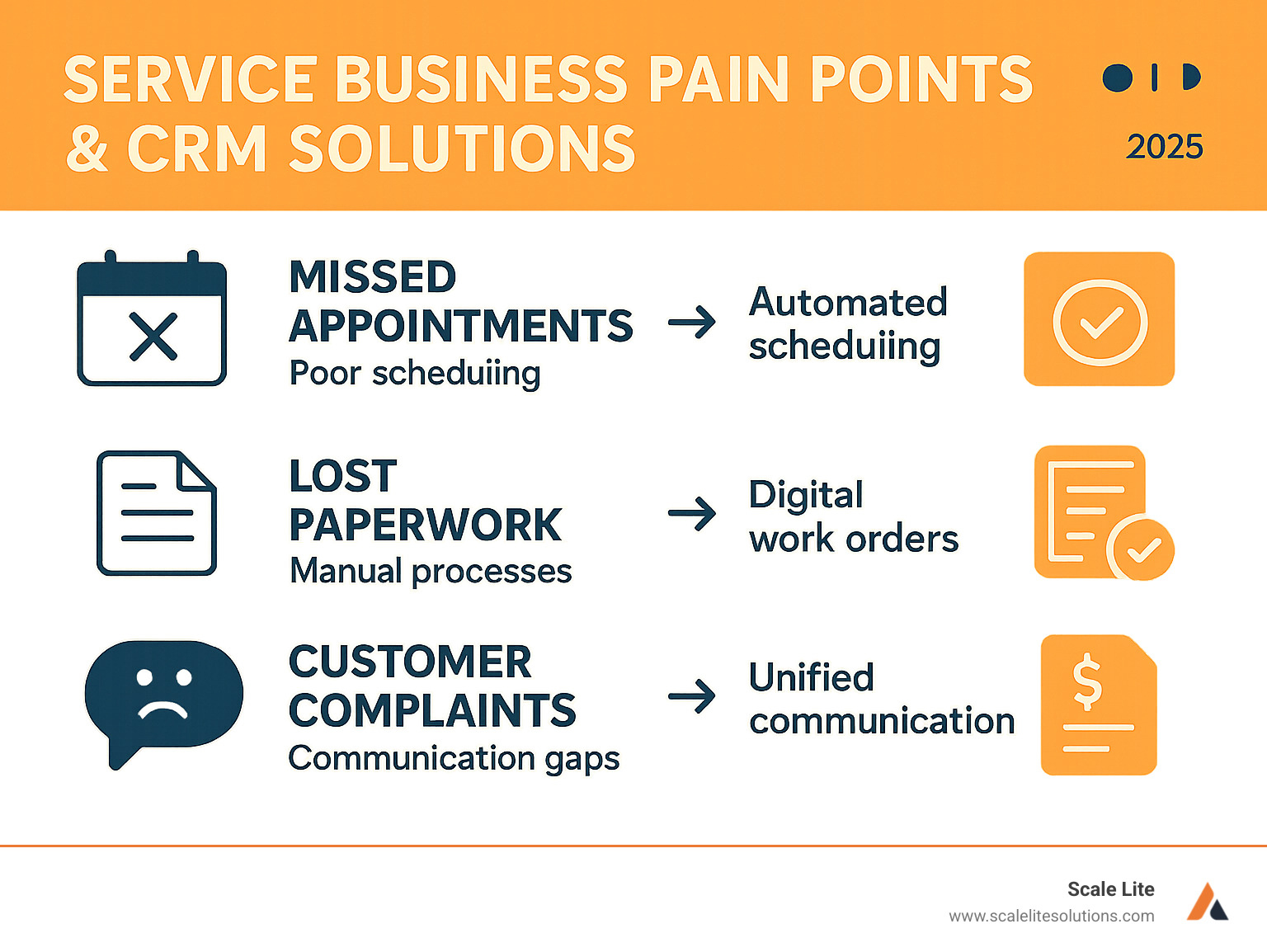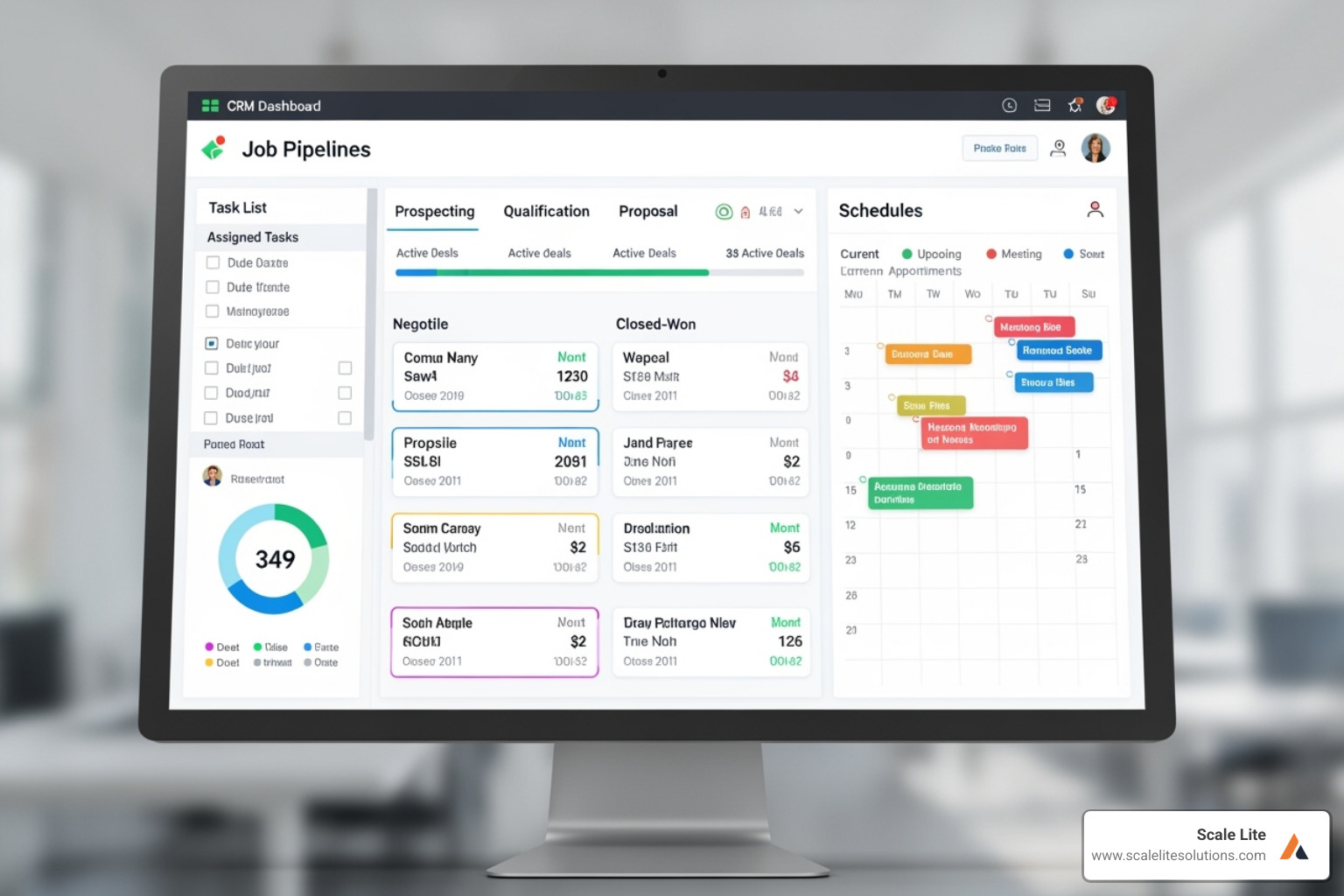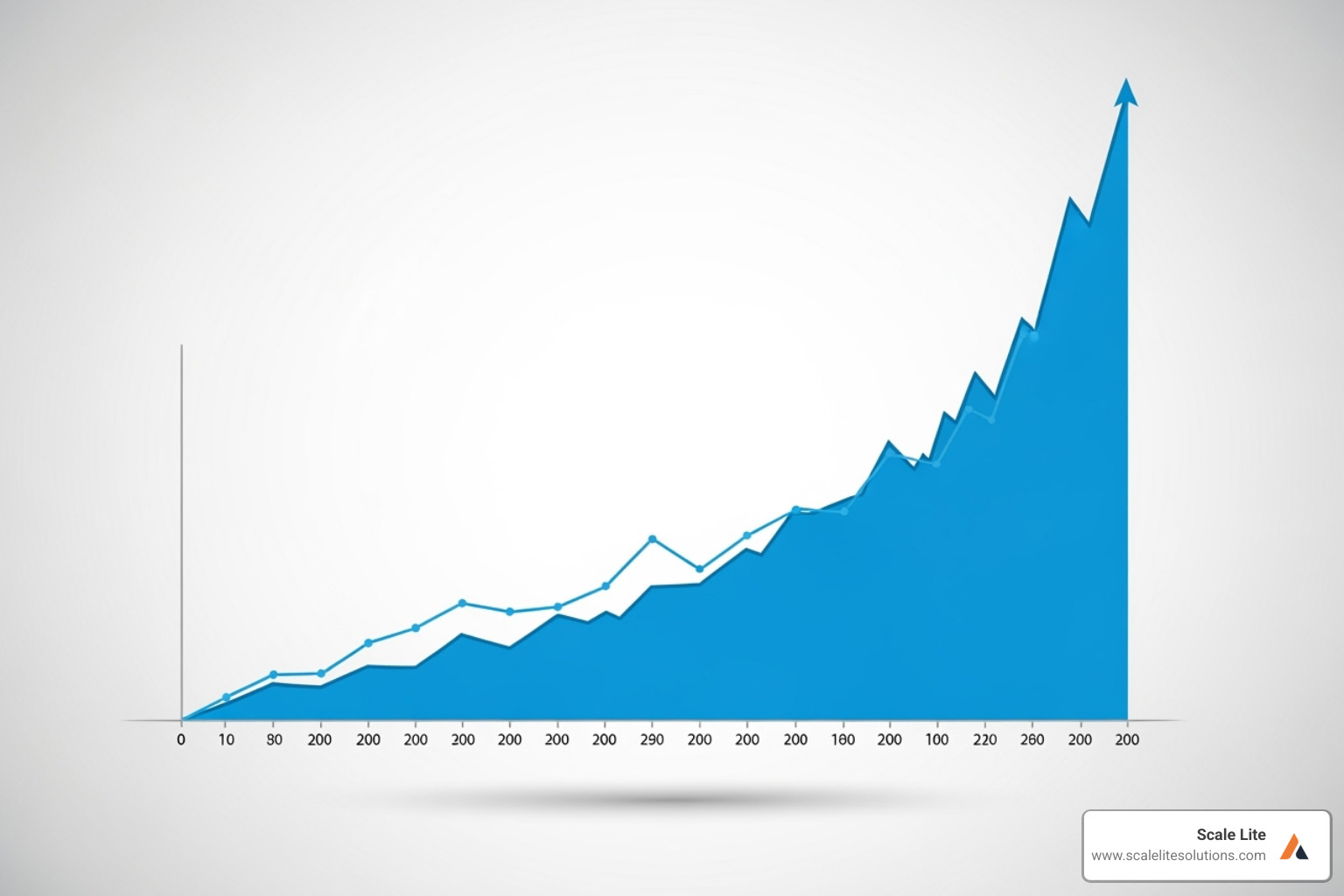
Choosing the Right CRM for Your Service Business Made Easy

Why Service Businesses Can't Survive on Spreadsheets Alone
CRM for service businesses is no longer optional—it's essential for any company that wants to grow beyond the owner's daily involvement. Service businesses face unique challenges that traditional office-based companies don't: managing mobile teams, coordinating on-site appointments, tracking work orders across multiple locations, and maintaining customer relationships through recurring services.
Quick Answer: Top CRM Benefits for Service Businesses
- Job Management: Schedule, dispatch, and track work orders from one central system
- Customer Communication: Unified inbox for calls, texts, emails, and service requests
- Mobile Access: Field teams can update jobs, capture photos, and process payments on-site
- Financial Integration: Seamless invoicing, payment processing, and accounting software sync
- Automation: Appointment reminders, follow-ups, and maintenance scheduling run automatically
The research is clear: companies using CRM systems see significant improvements in both efficiency and growth. According to industry data, 46% of small business owners rate automation capabilities as extremely important, while 55% of IT leaders prioritize system integration. Yet many service businesses still rely on a chaotic mix of sticky notes, spreadsheets, and email threads to manage their operations.
This disconnect creates real problems. Missed appointments cost money. Lost paperwork frustrates customers. Manual processes eat up time that could be spent growing the business. Without centralized data, you're flying blind when making decisions about pricing, capacity, or which customers generate the most profit.
The good news? Modern CRM systems are designed specifically for the unique needs of service businesses—from HVAC contractors to landscaping companies to cleaning services. They handle everything from initial lead capture to final payment, with mobile apps that keep field teams connected and automation that handles routine tasks.
I'm Keaton Kay, founder of Scale Lite, where I help service business owners modernize their operations and reduce owner dependence through strategic CRM for service businesses implementation. My background spans private equity (where I evaluated service companies for acquisition), enterprise SaaS sales, and revenue operations—giving me a unique perspective on what systems actually drive value in service businesses.

Key CRM for service businesses vocabulary:
Why Your Service Business Needs a Specialized CRM
Picture this: you're running a service business where every day brings new challenges that your retail friends never face. While they're selling products from a shelf, you're coordinating field agents, managing recurring services, and building relationships that span months or years. Your HVAC technicians need on-site jobs information at their fingertips. Your cleaning crews require real-time schedule updates. Your customers expect direct communication when their appointment changes.
This is where a CRM for service businesses becomes your secret weapon. Unlike generic business software, it's built specifically for companies where customer relationships over transactions drive success. When the speed of service and customer happiness determine whether clients stick around for the long haul, you need tools that support those priorities.
The reality is simple: service businesses that accept specialized CRM systems see dramatic improvements in both efficiency and customer loyalty. They can handle more jobs without adding chaos, keep customers happier with better communication, and actually have time to focus on growing instead of just surviving each day.
The Unique Demands of the Service Industry
Service businesses sell intangible products where the experience is everything. Work is often project-based with high scheduling complexity, where one delay can disrupt multiple jobs. A mobile workforce adds another layer of logistical challenge. Success hinges on customer relationships over transactions, as clients look for a trusted partner for ongoing and future needs, requiring consistent, flawless communication.
Moving Beyond Spreadsheets and Sticky Notes
Relying on spreadsheets and sticky notes is exhausting and holds your business back. This manual approach creates data silos, where information is trapped and inaccessible to the team members who need it. The result is a cascade of manual errors—double-booked appointments, missed follow-ups, and incorrect invoices—that damage customer trust.
Worse, it leads to a lack of visibility, forcing you to make decisions based on gut feelings instead of data. This chaos only multiplies as you grow, creating major scalability issues. A CRM for service businesses solves this by centralizing all information.
It connects your office and field teams, automates routine tasks, and provides the clear data needed for smart Data-Driven Decision Making. It replaces inefficiency with systems that improve business operations and enable sustainable growth.
The Core Toolkit: Must-Have CRM Functionalities

Think of a modern CRM for service businesses as the brain of your operationone that never forgets an appointment or loses a work order. It's the single source of truth that keeps everyone on the same page. Your CRM should handle four core areas: job management, customer communication, financial tracking, and mobile access for your field teams.
Managing Field Operations with Ease
A solid CRM for service businesses transforms chaotic field operations into a symphony of efficiency. It streamlines scheduling and dispatching, eliminating phone tag and ensuring technicians have the right information. Detailed work orders provide customer history, instructions, and photos from past visits. Smart route optimization saves time and fuel, while real-time job status updates keep the entire team informed. As research from Zoho highlights, businesses can "schedule and dispatch jobs with ease" and track progress seamlessly. This visibility is key to successful Contractor Customer Relationship Management.
Unifying Customer Communication and Support
Picture this: a customer calls, and you instantly see their entire service history. That's the power of unified communication. A great CRM for service businesses creates omnichannel communication, logging every phone, text, and email conversation in a centralized inbox. No more digging through systems or asking customers to repeat themselves. Call logging is automatic, email templates speed up common replies, and automated appointment reminders reduce no-shows. Zoho's platform research demonstrates how businesses can "unify customer interactions" and "personalize every way of your engagement." This approach ensures every team member has a complete view of your customers, which is essential for How to Improve Customer Satisfaction. For a concise overview of foundational concepts, see Customer relationship management.
From Quote to Cash: A CRM for service businesses Finances
A well-designed CRM for service businesses streamlines your financial processes. It starts with professional estimates and quotes to win jobs. After completion, invoicing can be automated, and on-the-spot payment processing improves cash flow. Comprehensive financial reporting provides a clear view of your business's health, showing which services are most profitable. The biggest time-saver is integration with accounting software like QuickBooks, which eliminates double data entry. As Zoho's research confirms, businesses can "keep all your finances in one place" and "create invoices directly from CRM and mark payment status." This means less time chasing payments and more time serving customers.
How a CRM Boosts Growth and Efficiency

Here's where things get exciting. A CRM for service businesses isn't just about getting organized—it's about turning your operation into a growth machine. The real magic happens by building lasting customer relationships, integrating your business tools, and making your marketing more precise.
Building Unbreakable Customer Loyalty
A CRM for service businesses helps you build unbreakable customer loyalty by identifying and nurturing your best clients. It allows you to personalize every interaction by tracking service history and preferences. Your CRM remembers details like preferred appointment times or communication methods, making customers feel valued. This data also helps you spot opportunities for relevant upsells, like offering a maintenance plan to a recent repair customer. You can even automate maintenance plans with recurring schedules, proactively reminding clients about upcoming service. As industry data shows, CRMs help businesses "target high-value customers, then treat them to personalized service." This level of attention turns satisfied customers into loyal advocates, which is the foundation of a strong Business Growth Strategy.
The Power of Connection: Integrating Your CRM
Disconnected systems are productivity killers, which is why 55% of IT leaders say system integration is a high priority. Your CRM for service businesses becomes exponentially more powerful when it talks to your other business tools. Imagine your CRM automatically syncing with your accounting software, so an invoice is generated the moment a job is marked complete. Or picture your field service management tools updating job statuses in real-time, giving office staff accurate information for customers.
When your CRM integrates with marketing platforms, you can see exactly which campaigns bring in the most profitable work. This data sync eliminates double-entry, reduces errors, and frees up your team to focus on customers. It's how you truly Streamline Operational Processes instead of just moving chaos around.
Personalized Marketing for Service Professionals
Forget the old spray-and-pray marketing tactics. A modern CRM for service businesses turns your marketing from a shotgun into a sniper rifle. By segmenting customers based on their service history and location, you can send messages that actually matter. Targeted email campaigns become incredibly effective when they're based on real data, solving problems instead of creating noise.
ROI tracking becomes crystal clear, showing you which campaigns bring in customers who actually buy. This means every marketing dollar works harder. Modern systems even include AI-powered assistants to handle initial inquiries and book appointments, ensuring no lead falls through the cracks. The end result is marketing that feels helpful, not pushy, and growth that's sustainable. It's the difference between hoping for customers and systematically creating them through strategic Marketing for Business Growth.
Key Considerations When Choosing a CRM for Your Service Business

Choosing the right CRM for service businesses is about finding a system that fits your business like a glove. The best CRM isn't the one with the most features; it's the one that solves your biggest problems and makes your life easier. Pick the wrong one, and you'll create more work. Choose wisely, and you'll have a powerful partner for growth.
Evaluating Your Business Needs First
Before looking at demos, first evaluate your own operations. As Salesforce suggests, start by identifying "your business's biggest challenges and expectations for a CRM." Are you struggling with scheduling, disorganized customer data, or lost invoices? Pinpointing your main pain points is essential. Also, consider your team size, workflow, and budget. The cheapest option isn't always the most cost-effective in the long run. Your list of required features should directly address your challenges. If scheduling is a nightmare, dispatching tools are a must-have. This focused approach to Business Process Streamlining ensures you choose a CRM that solves your real-world problems.
Top Features to Look For in a CRM for service businesses
With your needs defined, focus on these non-negotiable features for a CRM for service businesses:
- Mobile App Quality: Your field team relies on their phones, so a high-quality, intuitive mobile app is essential. A clunky app will be ignored, defeating its purpose. As a Zoho user noted, a good mobile app can be an "advantageous tool for any organization."
- Scheduling and Dispatching: The system must handle the dynamic nature of service work, with flexible scheduling, real-time updates, and smart routing to save time and fuel.
- Invoicing and Payments: Streamline cash flow with integrated tools to create quotes, send invoices, and process payments all in one place.
- Customization: Look for the ability to add custom fields and reports to track the metrics that matter most to your specific business, from equipment types to customer satisfaction scores.
- Automation Capabilities: The right automation handles repetitive tasks like appointment reminders and follow-ups, freeing your team to focus on high-value work. As research shows, automation can be applied to "every section of the sales funnel and every department in your business."
Finally, as HubSpot advises, consider overall "ease of use, scalability, compatibility, price, and service and support." The best CRM is one your team will actually use because it makes their jobs easier. This is key when choosing the right CRM Software for Contractors and other service professionals.
Frequently Asked Questions about CRMs for Service Businesses
What is the main benefit of a CRM for a small service business?
The biggest game-changer? Centralizing all your job and customer information in one place. Think about it—no more hunting through three different spreadsheets to find Mrs. Johnson's service history, or wondering if your technician remembered to update that work order status.
A CRM for service businesses eliminates the chaos that comes with scattered information. It streamlines your entire operation, from that first phone call to final payment collection. Your scheduling becomes bulletproof, your invoicing flows seamlessly, and your team can provide faster, more personalized service.
The result? Customers who keep coming back because they feel heard, understood, and well-cared-for. It's like upgrading from a paper map and compass to a GPS system—you'll wonder how you ever managed without it.
How does a mobile CRM help my field technicians?
Picture this: your technician arrives at a job site and pulls out their phone. Instantly, they have access to the customer's complete service history, special notes about their preferences, driving directions to the next appointment, and all the job details they need.
A mobile CRM becomes their office in their pocket. They can update work orders on the spot, snap photos of completed work, collect payments right there, and communicate with your office in real-time. No more frantic calls back to base asking "What was the customer's gate code again?" or "Did they want the premium filter or standard?"
This real-time connection dramatically improves both efficiency and accuracy. Your technicians look more professional, work more confidently, and can focus on what they do best—delivering excellent service—instead of wrestling with paperwork and communication gaps.
Can a CRM integrate with the accounting software I already use?
Absolutely! Most modern CRM for service businesses systems are built to play nicely with popular accounting software like QuickBooks, Xero, and others. It's like having a translator that helps all your business tools speak the same language.
This integration works behind the scenes to automate the tedious stuff. When you create an invoice in your CRM, it automatically syncs with your accounting software. Payments get recorded in both systems. Financial reports pull data from everywhere, giving you a crystal-clear picture of your company's financial health.
The beauty is in what you don't have to do anymore—no more double data entry, no more manual reconciliation between systems, and no more wondering if your books match your CRM records. You get back hours of administrative time that you can spend on growing your business and serving customers better.
Conclusion
Think of this journey we've taken together like building a house. We started by recognizing that your current tools—those trusty spreadsheets and sticky notes—are like trying to construct a mansion with a hammer and some nails. They might work for a small project, but when you're ready to scale your service business, you need the right foundation.
The importance of specialization in your CRM choice can't be ignored. Generic business software is like a Swiss Army knife—it does many things, but none of them exceptionally well. A CRM for service businesses is more like a master craftsman's toolbox, with every feature designed specifically for the unique challenges you face daily. It understands your recurring services, knows how to manage your mobile workforce, and recognizes that customer relationships are the heartbeat of everything you do.
Here's the thing about long-term value: when you invest in the right CRM for service businesses, you're not just buying software. You're investing in your company's future. You're creating a system that grows with you, adapts to your changing needs, and becomes more valuable as your business expands. It's the difference between constantly fighting fires and having a well-oiled machine that practically runs itself.
The enterprise value you build through proper CRM implementation extends far beyond daily operations. When your business runs efficiently, when your customers are consistently happy, and when your data tells a clear story of growth and profitability, you're creating something truly valuable. Whether you're planning to sell someday or simply want to build a legacy, these systems become the backbone of a business that can thrive without you being involved in every single decision.
At Scale Lite Solutions, we've seen how the right technology transforms service businesses. Our holistic approach combines AI deployment, workflow automation, smart data gathering, and CRM optimization to create something greater than the sum of its parts. We're not just tech consultants—we're partners in building businesses that work smarter, not harder.
Ready to stop juggling flaming torches while herding cats? The path to modernizing your service business starts with understanding that you deserve tools designed for your success. Learn more about our comprehensive approach to How to Drive Business Growth and find how we can help you build a business that truly works for you, not the other way around.






